Published 18:06 IST, December 20th 2022
Taiwan may fine Foxconn over 'unauthorised' investment in China's chipmaking firm
Foxconn is reportedly facing the threat of being fined by Taiwan's government for an unauthorised investment in a Chinese semiconductor manufacturing firm.

Foxconn is a Taiwanese multinational electronics contract manufacturing company that is headquartered in New Taipei City, Taiwan. It is one of the largest electronics manufacturing companies in the world and has factories in several countries, including China, Vietnam, and Mexico. Foxconn is known for producing a wide range of electronics products, including smartphones, tablets, laptops, and other consumer electronics, as well as components such as printed circuit boards and LCD panels. Some of the major brands that Foxconn has manufactured products for include Apple, Sony, Microsoft, and Amazon.
Now, Foxconn is reportedly facing the threat of being fined by Taiwan's government for an unauthorised investment in a Chinese chipmaker, as per a report from the South China Morning Post. Foxconn apparently acquired a stake in Chinese chipmaker Tsinghua Unigroup. The stake was disclosed in July and on Friday last week, Foxconn said it would sell off the stake. The stake was not greenlighted by Taiwan's government, which has to greenlight all outbound investments. Taiwanese law allows the government to restrict investment "based on the consideration of national security”. Semiconductors are crucial due to their geopolitical importance. Nations who manufacture advanced semiconductors can use it as a tool of coercion in geopolitics. Taiwan has been concerned about China's efforts to boost its semiconductor industry.
China wants to gain the upper hand in semiconductor technology
China has been actively seeking to develop its own semiconductor industry in recent years, both to reduce its reliance on imported chips and to strengthen its domestic technology sector. To achieve this goal, the Chinese government has implemented a number of policy initiatives and programs designed to support the growth and development of the domestic semiconductor industry. One key policy initiative has been the establishment of the "Made in China 2025" plan, which aims to increase the domestic production of high-tech industries, including semiconductors.
Under this plan, the government has invested heavily in research and development, as well as providing tax breaks and other financial incentives to companies engaged in the production of semiconductors and other high-tech products. In addition, the Chinese government has also established a number of programs specifically aimed at supporting the growth of the semiconductor industry, such as the "Integrated Circuit Industry Investment Fund," which provides funding for research and development of advanced semiconductor technologies. The US has imposed import restrictions on China, to cut off its access to advanced semiconductor manufacturing technology. The US wants to ensure it can choke the Chinese semiconductor industry before Beijing acquires technological dominance in the sector, which would give it a significant advantage.
Updated 18:06 IST, December 20th 2022




